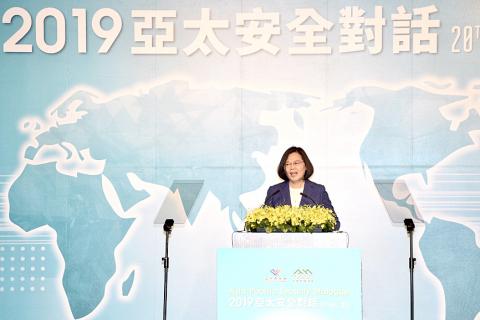The protests in Hong Kong are proof that China’s “one country, two systems” model does not work, because authoritarianism and democracy cannot coexist, President Tsai Ing-wen (蔡英文) told a security forum in Taipei yesterday, alerting the world to Chinese expansionism.
While Taiwan promotes sustainable and joint development projects with its partners, Chinese military expansionism has sparked concern in many countries, Tsai said at the 2019 Asia-Pacific Security Dialogue, citing Beijing’s aggressive claims over territory and its military buildup in the South China Sea.
China has not given up its ambition to annex Taiwan by force or impose its “one country, two systems” model on the nation, despite the model’s failure in Hong Kong, the president said.

Photo: Peter Lo, Taipei Times
Taiwan has been developing its own aircraft and submarines, with its first domestically developed training aircraft model to be finished in the second half of next month, she said, while thanking US President Donald Trump’s administration for its four previous arms sales to Taiwan.
Trump on Sunday said he had approved another US$8 billion package for the sale of 66 upgraded F-16V jets to Taiwan.
The Ministry of National Defense on Monday said it hoped the US Congress would approve the deal as soon as possible to benefit peace and security in the Taiwan Strait and the Asia-Pacific region as a whole.
Former Australian minister for defense Christopher Pyne — who resigned in May and is visiting Taiwan for the first time — also warned of China’s increasing militarization in the South China Sea and talked of Australia’s continuous investment in defense and telecommunications facilities.
Asked about a report released on Monday by the US Studies Centre at the University of Sydney that said the US military is losing its primacy in the Pacific, Pyne said he has not yet read the report, but that it would be an exaggeration to say that the US is losing its primacy.
“You need to remember that one of every two dollars in the world that is spent on defense is being spent by the United States,” which continues investing in the area and related alliances, he said.
The US also has many allies and partners, including Taiwan, Japan and South Korea across the Pacific, he said.
“Now the world is watching Hong Kong,” where the protests are being driven by demands for freedom, liberty and respect for the rule of law, he said.
Pyne said that he does not think China would move against Hong Kong like it did on Tiananmen Square in 1989, given its increasing engagement in global economy and diplomacy.
How Beijing reacts to the protests would send a message across the region, he said.
Taiwanese, living in a different place from the territory, would also see what “one country, two systems” actually means, Pyne added.

Right-wing political scientist Laura Fernandez on Sunday won Costa Rica’s presidential election by a landslide, after promising to crack down on rising violence linked to the cocaine trade. Fernandez’s nearest rival, economist Alvaro Ramos, conceded defeat as results showed the ruling party far exceeding the threshold of 40 percent needed to avoid a runoff. With 94 percent of polling stations counted, the political heir of outgoing Costa Rican President Rodrigo Chaves had captured 48.3 percent of the vote compared with Ramos’ 33.4 percent, the Supreme Electoral Tribunal said. As soon as the first results were announced, members of Fernandez’s Sovereign People’s Party

EMERGING FIELDS: The Chinese president said that the two countries would explore cooperation in green technology, the digital economy and artificial intelligence Chinese President Xi Jinping (習近平) yesterday called for an “equal and orderly multipolar world” in the face of “unilateral bullying,” in an apparent jab at the US. Xi was speaking during talks in Beijing with Uruguayan President Yamandu Orsi, the first South American leader to visit China since US special forces captured then-Venezuelan president Nicolas Maduro last month — an operation that Beijing condemned as a violation of sovereignty. Orsi follows a slew of leaders to have visited China seeking to boost ties with the world’s second-largest economy to hedge against US President Donald Trump’s increasingly unpredictable administration. “The international situation is fraught

MORE RESPONSIBILITY: Draftees would be expected to fight alongside professional soldiers, likely requiring the transformation of some training brigades into combat units The armed forces are to start incorporating new conscripts into combined arms brigades this year to enhance combat readiness, the Executive Yuan’s latest policy report said. The new policy would affect Taiwanese men entering the military for their compulsory service, which was extended to one year under reforms by then-president Tsai Ing-wen (蔡英文) in 2022. The conscripts would be trained to operate machine guns, uncrewed aerial vehicles, anti-tank guided missile launchers and Stinger air defense systems, the report said, adding that the basic training would be lengthened to eight weeks. After basic training, conscripts would be sorted into infantry battalions that would take

GROWING AMBITIONS: The scale and tempo of the operations show that the Strait has become the core theater for China to expand its security interests, the report said Chinese military aircraft incursions around Taiwan have surged nearly 15-fold over the past five years, according to a report released yesterday by the Democratic Progressive Party’s (DPP) Department of China Affairs. Sorties in the Taiwan Strait were previously irregular, totaling 380 in 2020, but have since evolved into routine operations, the report showed. “This demonstrates that the Taiwan Strait has become both the starting point and testing ground for Beijing’s expansionist ambitions,” it said. Driven by military expansionism, China is systematically pursuing actions aimed at altering the regional “status quo,” the department said, adding that Taiwan represents the most critical link in China’s